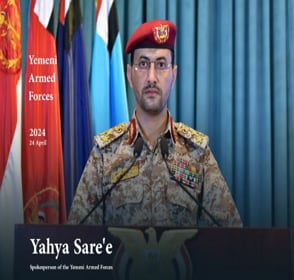The following report is now a complimentary offering from MEMRI's Jihad and Terrorism Threat Monitor (JTTM). For JTTM subscription information, click here.
In an unexpected move on March 10, 2023, Saudi Arabia and Iran declared that they had reached an agreement to renew relations after a seven-year hiatus.[1] Through Chinese mediation, the two countries agreed to reopen their respective embassies within two months, and to reactivate past Saudi-Iran agreements, among them a 2001 security cooperation agreement.[2]
Over the following days, various jihadi groups and clerics around the Middle East reacted to the development. Below is a review of their commentaries.
Houthi Spokesman: Positive Renewal For Security In The Region Following Foreign Invasions
Muhammad 'Abd Al-Salam, the official spokesman of the Houthi Ansar Allah movement, said of the agreement that the region was in need of such a renewal, which will enable the Islamic nation to restore the security it lost due to the U.S.-led foreign intervention.[3]

Senior Iraqi Official In Hay'at Tahrir Al-Sham (HTS): Gulf Countries Have Rescued Iran, Ignoring Its Threat
Senior Iraqi-born HTS religious official Maysarah Al-Jubouri (also known as Abu Mariyah Al-Qahtani) wrote on his Telegram channel that "the rulers of the Gulf hurry to rescue the Iranian regime every time it reaches the abyss," adding that the renewal of diplomatic relations constitutes "running away from cancer with painkillers", and that "Iraq had been a steadfast obstacle that had stopped the advance of the Safavids [a pejorative term for Iran] and their criminal project." In his view, the Gulf states encouraged the U.S. invasion of Iraq on the basis of groundless claims, leading to the "crushing of the Arabs' skulls, and [Iraq] became an Iranian village."[4]
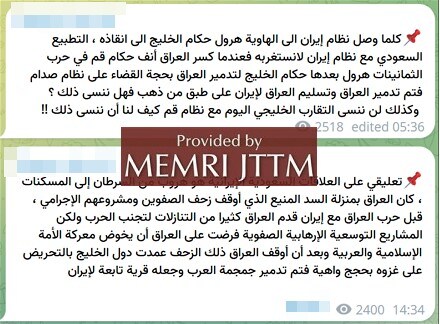
Hizbullah Leaders: Positive Development That Will Benefit The Region, Painful Blow Against The 'American Israeli Plan'
In a speech delivered at a ceremony held on March 10, Hizbullah Secretary-General Hassan Nasrallah touched on the agreement, hailing the renewal of diplomatic relations between Iran and Saudi Arabia as a positive development that would benefit the nations of the region.
Nasrallah further stated that the siege on Syria would be removed due to several "global and local developments," without directly mentioning the agreement between Iran and Saudi Arabia, and rejected the possibility of Syria leaving the "resistance axis" and "returning to the Arab embrace."[5]
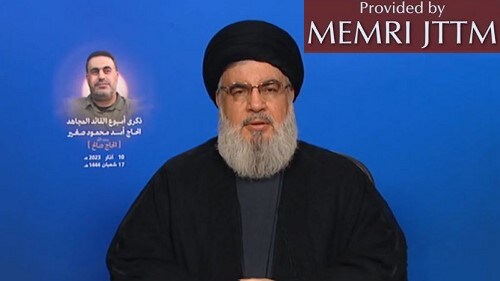
In a March 12 tweet, Hizbullah Deputy Secretary-General Na'im Qasem wrote that the renewal of diplomatic relations between Saudi Arabia and Iran was an important development for the stability and security of the region, constituting "a painful blow against the American-Israeli plan."[6]
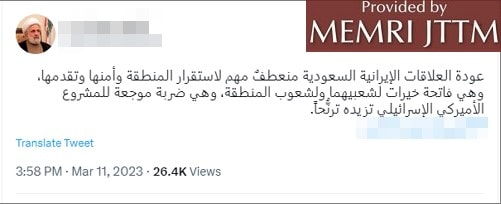
Pro-Al-Qaeda Cleric: America Is Losing Its Grip On The Middle East To 'Infidel' Russia And China
Canada-based Egyptian-born pro-Al-Qaeda cleric Tariq Abdelhaleem commented on the agreement on his Telegram channel: "There is no doubt that control of the Middle East, which had been exclusively in the hands of the United States since World War II, has begun to waver and slip out of [America's] hands." He added the assertion that control of the region, instead of returning to the local nations, was being transferred to Russia and China, which "cannot control themselves because they are led by unbelievers and wicked people."
Mocking the United States for adopting a policy of promoting "barbarian factions" that only "condemn and warn and reserve the right to retaliate," the cleric wrote: "May Allah cut off their wings. The trouble is that they have sprouted small and illegal wings that control our countries."[7]

Pro-Islamic State (ISIS) Channel: Saudis And Iranians Are Brothers in "Infidelity And Polytheism" – Saudi Arabia Is Seeking Iranian Mediation To Restore Relations With Syria – America Will Eventually Withdraw Its Support To The Saudis
The pro-Islamic State (ISIS) Bariqah news agency commented on the agreement by lashing out at Saudi Arabia for its hypocrisy, claiming that in the past the Kingdom's officials accused ISIS of collaborating with Iran, and now the country has initiated a rapprochement with the Iranian regime "since they are brothers in their sect of infidelity, polytheism of rule and legislation, and worshiping of graves."[8]
The channel further claimed that the Saudi royal family has historically surrendered to America and to whoever holds the reins of power. It added that while until recently the Saudis considered Syrian president Bashar Al-Assad a criminal that must be fought by any means—and even supported "mercenaries" against him—today they are considering reestablishing relations with him through the mediation of Iran.
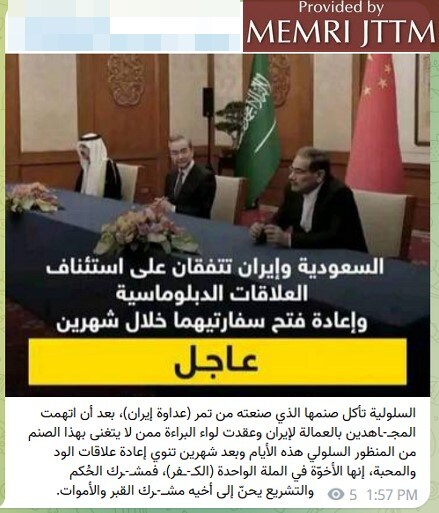
The following day, Bariqah shared a post stating that "just as the U.S. surrendered Iraq over on a golden platter to the Shi'ites, and just as it surrendered Syria, Lebanon, and Yemen to them as well, so too will it surrender Mecca and Medina to them, it will withdraw its forces and leave the [Saudi Royal Family] to their fate, and their downfall will resound."[9]
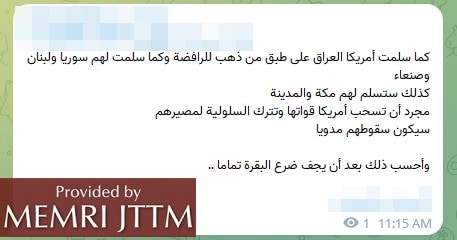
[1] Saudi-Iranian relations were severed in 2016 after demonstrators attacked the Saudi Embassy in Tehran and its consulate in Mashhad following Saudi Arabia's execution of the Saudi Shi'ite oppositionist cleric Nimr Baqr Al-Nimr. See MEMRI Special Dispatch No. 6251: Iran Furious Over Saudi Arabia's Execution Of Shi'ite Sheikh Nimr Al-Nimr, January 4, 2016; and Inquiry & Analysis No. 1215: Unprecedented Tension Between Saudi Arabia, Iran Following Execution Of Shi'ite Cleric Nimr Al-Nimr, January 4, 2016.
[2] See MEMRI JTTM Report: In Saudi Press, Cautious Optimism Follows Saudi-Iranian Renewal Of Relations, March 13, 2023.
[3] Telegram, March 10, 2023.
[4] Telegram, March 11, 2023.
[5] Alahednews.com.lb, March 10, 2023.
[6] Twitter, March 11, 2023.
[7] Telegram, March 11, 2023.
[8] Telegram, March 12, 2023.
[9] Telegram, March 13, 2023.
The full text of this post is available to subscribers.
Please login or register to request subscription information from MEMRI





